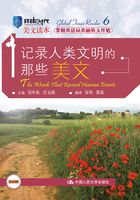
15 Hypothesis on Biological Clocks of Migrants
动物学:介绍候鸟飞行机制的三种假说
导读
候鸟迁徙为什么不会迷失方向呢?科学家们经过反复多次的观察与研究发现,原来世界上的候鸟,不管是白天飞行的,还是夜间飞行的,它们都有一种特殊的导航本领。
A mysterious phenomenon is the ability of over-water migrants to travel on course. Birds, bees, and other species can keep track of time without any sensory cues
to travel on course. Birds, bees, and other species can keep track of time without any sensory cues from the outside world, and such “biological clocks”clearly contribute to their “compass sense
from the outside world, and such “biological clocks”clearly contribute to their “compass sense .”For example, they can use the position of the Sun or stars, along with the time of day, to find north. But compass sense alone cannot explain how birds navigate the ocean: after a flock traveling east is blown far south by a storm, it will assume
.”For example, they can use the position of the Sun or stars, along with the time of day, to find north. But compass sense alone cannot explain how birds navigate the ocean: after a flock traveling east is blown far south by a storm, it will assume the proper northeasterly course to compensate. Perhaps, some scientists thought, migrants determine their geographic position on Earth by celestial navigation
the proper northeasterly course to compensate. Perhaps, some scientists thought, migrants determine their geographic position on Earth by celestial navigation , almost as human navigators use stars and planets, but this would demand of the animals a fantastic map sense
, almost as human navigators use stars and planets, but this would demand of the animals a fantastic map sense . Researchers now know that some species have a magnetic sense, which might allow migrants to determine their geographic location by detecting variations in the strength of the Earth's magnetic field
. Researchers now know that some species have a magnetic sense, which might allow migrants to determine their geographic location by detecting variations in the strength of the Earth's magnetic field .
.
候鸟按一定航线在水上飞行的能力是一种神秘的现象。鸟类、蜜蜂及其他生物物种能够在没有任何外界感觉提示的情况下掌握时间。这种“生物钟”本能显然有助于其“指南针定向的感觉”。例如鸟类能够利用太阳或恒星的位置随同一天的时间来找到北方。但是,单靠指南针定向感觉不能解释鸟类飞越大洋的情况:一群向东飞行的鸟被风暴远远吹向南方以后,会采取适当的东北航向飞行来加校正。也许有些科学家认为,候鸟使用天文导航法确定其在地球上的地理位置,跟人类航海者利用恒星和行星导航几乎一模一样。但这就要求这些动物具有一种异想天开的地图感觉。科研工作者目前了解到有些物种具有一种地磁感觉。这种感觉也许能够使候鸟通过深测地球磁场强度的变化来确定其地理位置。
Sentence Translation
翻译练习
1. Birds, bees, and other species can keep track of time without any sensory cues from the outside world, and such “biological clocks” clearly contribute to their “compass sense.”
2. Perhaps, some scientists thought, migrants determine their geographic position on Earth by celestial navigation, almost as human navigators use stars and planets, but this would demand of the animals a fantastic map sense.
Key
1.鸟类、蜜蜂及其他生物物种能够在没有任何外界感觉提示的情况下掌握时间。这种“生物钟”本能显然有助于其“指南针定向的感觉”。
2.也许有些科学家认为,候鸟使用天文导航法确定其在地球上的地理位置,跟人类航海者利用恒星和行星导航几乎一模一样。但这就要求这些动物具有一种异想天开的地图感觉。
Emulation
美文自己写得出——学生仿写
仿写范例
Should University Students Go in for Business?
People keep asking a question: where does the knowledge essential for a successful existence come from, books or experience? Some people who are against the idea of students doing business during university education say that students should use their time to focus exclusively on studying, while others believe that it is good for university students to adapt to society in this way. I side with the latter, in the belief that doing business helps students know more about their majors, provides valuable practical experience and allows them a feeling of success and independence that is a perfect complement to their academic pursuit.
A popular criticism of universities is that they are “ivory towers” or places where study and research are divorced from the “real world.” Doing business related to their majors could give students an exciting chance to apply the theories they have learned in class. For example, financial theory is a notoriously abstract and difficult subject. When a student takes chances to operate his own business, no matter how small it might be, he might discover that the abstract words in classes may somehow turn out to be useful business strategies in reality. And this student might return to his financial theory class happily with renewed vigor and a filled wallet. It is in doing business that an abstract academic pursuit becomes a concrete and interesting goal with a real relationship to the student's life.
Doing business during university education also helps students strengthen their resumés, build important contacts with different companies and equip them with necessary communicating skills. All of these are very important practical experience that they could not get from textbooks. For no matter how hard they try, textbook publishers could barely keep up timely with the rapid development of society, or the complex interpersonal relationship in the real world. Besides, when the students graduate from universities, they could make full use of the social relations built during the experience to find a proper job, or to approach other employers with good references and cutting-edge work experience.
Finally, the feeling of success that comes from holding a business can build students' confidence. Knowing that they can run a business well and be paid for their endeavors is an important character-building experience that many students put off for too long. Learning to manage the money that they make will be another reward that would be a critical part for their future lives. Even if they might make mistakes in handling their money during this period, the results will probably not be disastrous, but will teach them valuable lessons that they will be sure to remember in the future when they will be truly independent.
In a word, the advantages of university students going in for business during university education obviously outweigh the disadvantages. Although they might be faced with some setbacks in operating their business, the students could, through fair and foul, gain more in going through the challenges. They could relate what is leant in books to the real situations, make their resumés impressive, and above all, build up confidence. As long as they could tackle well the relationship between study and business, the reward would go beyond monetary gain.